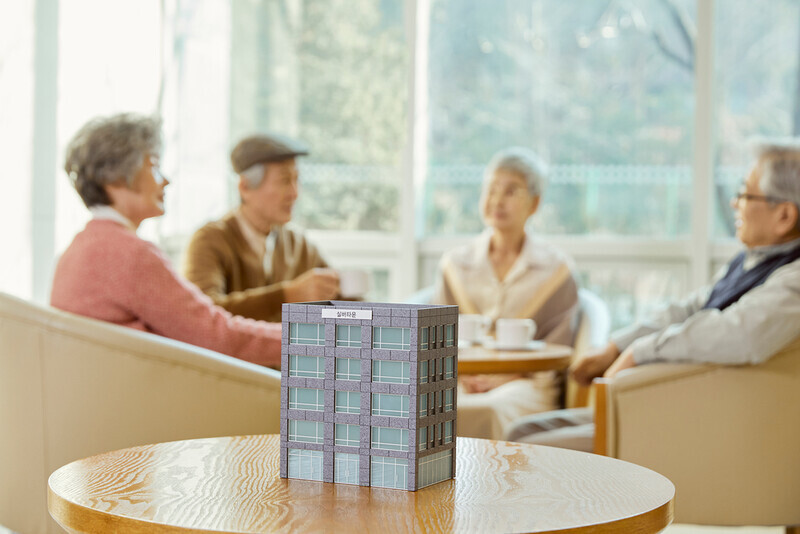
"The Classic 500" in Jayang-dong, Gwangjin-gu, Seoul, is one of the most expensive senior living facilities in Seoul. With a monthly management fee of 5 million won and a deposit of 1 billion won, it is known for its highest entry barrier. Nevertheless, there is a rush of applicants, and recently, some have been informed that they have to wait for more than two years for admission. Located in the station area of Konkuk University Station on Seoul Subway Line 2, one of the most bustling commercial districts in Seoul, it is also easy to use nearby cultural facilities and department stores.
As such demand increases, there is a growing desire in the real estate industry to build senior towns in the city center. This is because stable profitability is expected, and there are fewer concerns about business feasibility due to high demand. Nevertheless, due to strict licensing and other reasons, the actual number of places being built is limited. This is because the government's senior housing projects are mostly concentrated in the outskirts of the metropolitan area. This is why the industry says, "It would be a jackpot if built in Seoul, but it is virtually impossible."
Seoul, with Many Young and Old
According to the government, Seoul's aging index will reach 358.4 in 2030. This is higher than not only Chungbuk (331.4) and Chungnam (323.0) but also Daegu (325.4), Daejeon (275.1), and Gwangju (251.6). Considering that the burden of supporting the growing elderly population is also increasing, the rate of increase in Seoul's aging index is likely to increase further.
The related industry has long been thinking about elderly housing centered on the city. "If we supply welfare housing in the metropolitan area, the first inquiry we receive is, 'Are there any plans in Seoul?' It is difficult to answer," said the representative of a company that operates a number of elderly welfare housing in the metropolitan area.
In Seoul, there are already high-end residential facilities such as "The Classic 500" and "The Signum House" in Gangnam. However, they are evaluated as being too burdensome for ordinary elderly couples to live in because they require a lot of deposit and high monthly management fees. Elderly welfare housing operated by the public can be an alternative, but the supply is far insufficient compared to demand.
In fact, the demand for elderly people who want urban locations such as Seoul is steadily increasing. According to a survey of 307 people aged 55-79 living in the metropolitan area by Heirim Architects & Engineers and real estate investment consulting firm R2Korea in March-April last year, location was cited as a major consideration when moving into senior housing. Urban locations are more important than living support services such as cleaning and laundry. In particular, 68.1% of respondents said they wanted to live in senior housing in Seoul and the metropolitan area. The report explained, "The elderly consider the living infrastructure environment of the surrounding area, where food, clothing, and shelter are convenient, and convenience facilities, hospitals, and community links are possible, as important for silver towns."
Senior Housing Supply Centered on Local Areas
Although the preference of the elderly generation is concentrated in the metropolitan area, the government's policy to supply them is focused on local areas. The government has re-allowed the sale-type silver towns that had been banned since 2015. However, sale-type silver towns can only be built in 87 depopulation areas nationwide.
The construction industry, which supplies silver towns, is reacting that it is virtually a message not to build sale-type silver towns. "There is no infrastructure and no demand in depopulation areas," said an official from the construction industry. "Just because you build a sale-type silver town in an unpopular area, silver generations in the metropolitan area will not pay a lot of money and move in."
It is inevitable that participation is limited because it is difficult to make profits from the supplier's point of view. There are alternatives such as long-term private rental 'Silver Stay' that can be supplied in the city center. However, it is difficult to secure profits with 20 years of rental income in a situation where initial investment costs are high. For this reason, the industry is calling for the door to be further opened so that sale-type silver towns can be built in areas other than depopulation areas.
There is also a voice that more incentives should be provided from the supplier's point of view to further supply Silver Stay. "To limit high rents, additional incentives such as tax benefits are needed from the supplier's point of view," said an official from the construction industry. "In the case of Silver Stay, additional measures are needed for supply in a situation where rent is forced to 95% of the market price."
The industry also advises that elderly housing policies should be tailored to the 'new elderly'. It is necessary to supply housing tailored to the lifestyles and values of the baby boomer generation entering the elderly class. According to the 2023 elderly status survey, the proportion of business and labor income of the elderly class increased significantly from 39% in 2008 to 53.8%. On the other hand, private transfer income decreased significantly from 30.4% to 8.0% during the same period. The industry explains that the elderly prefer housing in the city center rather than local areas for continuous income activities.
It is also necessary to pay attention to the fact that the elderly class has increased its consumption power while continuing its income activities. "It has been found that the new elderly class tends to use income and assets with their spouses rather than inherit property," said an official from the construction industry. "The need for urban high-end elderly housing tailored to this will increase further."
[Copyright (c) Global Economic Times. All Rights Reserved.]






























